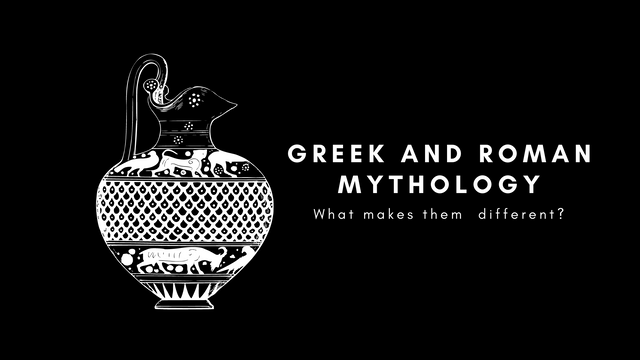Greek and Roman Mythology: What makes them different?
Author's note: The following text was published on Spanish language in Blurt on December 19th, 2020.
On the last post, Greco-Roman mythology has been the source of various literary and artistic works, reaching a considerable presence in the Western imagination. However, an important aspect that is not so covered in this particular topic is the distinction of the differences between both collections of myths.
According to Gordon Cheers (2019), it may be due to the Roman conquest of Greece in the Third Century BC,; after the conquest, the Romans adapted most of the Greek myths to their religion, especially the Greek Pantheon, so today one assumes that both mythologies are inclusive of each other, with a few exceptions.
Now, what makes them different?
First, the function both civilizations gave to the myth. Cheers points out that the main guideline of the Greek myth was the demonstration of generosity with strangers, since it was not possible to know if one was facing a mortal or a divinity; instead, the main guideline of Roman mythology was the acclamation of military glories and the commemoration of the founding of Rome (2019: 16 and 17).
A second difference derives from this acclamation, which is the political use that the Romans gave to myth (and therefore to religion), especially during the Imperial period. When an emperor returned from a military campaign, he returned as a conqueror who had the favor of his own and foreign divinities, parading through the streets of the city in a horse-drawn cart, with Jupiterian attire (purple tunic embroidered with gold and laurel wreath), and with the scepter of the eagle. It was what sir James George Frazer denominates a "divinization" of the ruler, since the idea was that the emperor was the representative of Jupiter, father of the gods (1969: 185). Therefore, the return of the emperor meant, in a way, the arrival of new deities who would try to favor the Empire as long as they did not represent a political threat.
The next post will address the myth of creation from both mythologies.
Happy Holidays!

Banner made with Canva
Cited sources (Spanish translations)
.gif)
Your post has been curated by us! Received 20.00% upvote from @opb. Do consider delegate to us to help support our project.
Do join our discord channel to give us feedback, https://discord.gg/bwb2ENt
* This bot is upvoting based on the criteria : 1. Not plagiarised, 2. Post > 5min, 3. Author reputation > 25 4. Active engagement with othersDo upvote this commment if you 💚 our service :)
Thank you for the support, @opb!